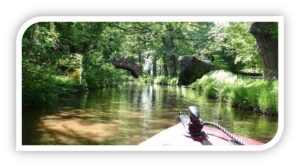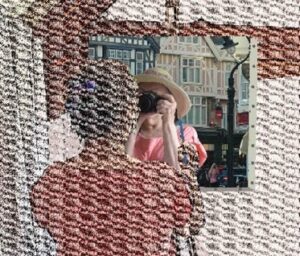
I was warned in the initial weeks of my doctoral programme, during induction, that my research title would inevitably change over time. Especially in the first few months. This was reassuring as moving from a research proposal into the serious business of being a postgraduate research (PGR) student is a whole new territory. My original title, and therefore my focus changed massively once I began the literature review process. It followed new directions, took on wider views before returning close to my original plan. I now had fewer travel bags, but each was much heavier.
The role of PGR students is to create their own ‘new certainties’ and make a sound contribution to an existing body of knowledge. But choices need to be made. To seek out new pathways through a familiar landscape, striking out in a new direction? But familiar landscapes may turn out to be well-travelled lanes with few opportunities for new explorations apart from rutted and stony tracks. Or to venture into unknown, unmapped territory where progress may be exacting, even overwhelming.
Choice, problems and implications:
- Could the route we take affect how we benefit ourselves as researchers?
- Could choosing between familiar or unexplored territory shift the benefit focus from our ‘research’ to ‘ourselves as researchers’?
- Developing ourselves as researchers enhances our research abilities.
- Developing our research skills improves our standing as researchers.
- Is choice dependent on our career path or our research specialism? On our own image of ourselves as researchers? Or our research stakeholders?
Setting out and views from established researchers
Postgraduate research is about action rather than attitude. Its nature is to review current belief or knowledge and to uncover the gaps that will determine our position for new study. But is this realistic? Brunet argues that the journey “has important consequences on a student’s current and future professional life”, (Brunet, 2022, p. 1032), and active journeying towards a professional goal is sufficient. For Leshem the journey is a “transition phase of developing new roles” (Cast, 2003, cited in Lesham, 2020, p. 170), and underscores a fundamental characteristic as “identity construction, rites of passage, tensions and resolutions” (Wisker et al., 2010, quoted in Lesham, 2020, p. 170). It is much more about attitude, building a research identity as the ‘student’ transitions into ‘research student’ and emerges as ‘researcher’.
PGR students have charge of their research because ultimately the prize at journey’s end is theirs. To be accepted into the PhD programme there is an expectation that your title and research questions are decided prior to your ‘upgrade’ assessment. You’ve scoured the literature, submitted your report, and perhaps presented your research to fellow academics before the upgrade viva. My understanding is of a finality, a shutting of the gate to further exploration just as your doctoral journey is confirmed. An expectation to keep to a focus that is largely uninformed at this stage, is a big ask.
Owens, et al. (2019) found that many doctoral students remain unclear about the outcomes from these deciding way-markers and recommend “providing opportunities for the development of a number of personal qualities as well as the professional profile of the students” (Owens, et al., 2019, p. 109).
Where next?
Continuing literature reviews is a doctoral research requirement and over the following two to six years there may be new avenues of exploration and new knowledge in our field. We may have new questions, a new focus.
Perhaps your doctoral journey is towards becoming a professional academic, treating the process as a project in your career development (Brunet, 2022). You’ve maintained your focus, followed the guidebooks, and avoiding unmapped paths. You arrive satisfied, having achieved your quest. You might explore or relax by the pool? Is this enough?
Perhaps your drive for research and to develop yourself personally and professionally is powered by a passion for learning (Mantai, 2019). Taking detours made your journey more challenging yet rewarding. Reaching your destination only leaves much more to explore. Will you be satisfied?
Quest or journey? Answers on a postcard.
As novice researchers is there intrinsic value in a quest that benefits a professional goal? Can a doctoral journey conceived from a desire for new knowledge, sharing insights, and challenging established perceptions succeed?
Should the choice be polarised when, ultimately, the doctoral research goal is to avoid stepping into others’ footprints, to face the challenge of discovery head-on, and to offer inspiration to those who follow?
(Words, 745)
References
Brunet, M. (2022) ‘Conducting a PhD as a project: sharing insights from my doctoral journey’, International journal of managing projects in business, 15(7), pp. 1032–1047. Available at: https://doi.org/10.1108/IJMPB-08-2021-0212.
Leshem, S. (2020) ‘Identity formations of doctoral students on the route to achieving their doctorate’, Issues in educational research, 30(1), p. 169-182. Available at: https://www.iier.org.au/iier30/leshem.pdf
Mantai, L. (2019) ‘“Feeling more academic now”: Doctoral stories of becoming an academic’, The Australian Educational Researcher (2019) 46:137–153. Available at: https://doi.org/10.1007/s13384-018-0283-x
Owens, A. et al. (2020) ‘Student reflections on doctoral learning: challenges and breakthroughs’, Studies in graduate and postdoctoral education, 11(1), pp. 107–122. Available at: https://doi.org/10.1108/SGPE-04-2019-0048
Marilyn Long
 I am a first year, full-time PGR student in the IET school. I am an autistic researcher, and my focus is to investigate inclusive provision and support for autistic students in higher education. I first studied with the OU in 1980 and since then gained my B.Ed degree and worked as a Primary school teacher, Early years co-ordinator, and staff development manager. After a gap of almost 20 years I enrolled for PG study with the OU in online and distance education before applying for a place as a PGR student.
I am a first year, full-time PGR student in the IET school. I am an autistic researcher, and my focus is to investigate inclusive provision and support for autistic students in higher education. I first studied with the OU in 1980 and since then gained my B.Ed degree and worked as a Primary school teacher, Early years co-ordinator, and staff development manager. After a gap of almost 20 years I enrolled for PG study with the OU in online and distance education before applying for a place as a PGR student.

Amazing! Its actually awesome piece of writing, I have got much clear idea on the topic of from this piece
of writing.
Thank you Hervé. I am pleased that you found my words interesting.
Marilyn,
I really enjoyed reading your blog post which I think raises important, even fundamental, issues about familiar versus unexplored territory and also contribution to knowledge versus the development of personal or research skills.
But both of these are set up as binary opposites. To take familiar versus unexplored as an example. The problem with seeing these in binary terms is that it risks not interrogating sufficiently what counts as familiar or what counts as unexplored. To take your metaphor of rutted tracks, it might be possible to critique why some tracks carry so much traffic that they become rutted, and consider why grass grows over nearby abandoned ones.
I write as a supervisor and I hope your post will stimulate discussion among students and supervisors.
Thank you so much for your comments Jonathan. And I totally agree on every point. This is my first blog for WELS and with a remit to offer a broad position, pose questions, and to open up new conversations. In around 750 words.
My own research is journeying from the familiar (being autistic), across the rutted paths of investigations based on traditional understandings of autism led by non-autistic researchers, onto the lush fields of Critical Autism Research and the lively debates on the role of authentic voices.
My image of the canal boat is a reflection of my own journey. Travelling with a purpose yet taking in the scenery, ready to explore the next curve and the challenge of locks, and find meaning in the shadows of tree canopies and tunnels.
It would be great to learn your students’ reactions. Perhaps using metaphors at all simply confuses the issues.
Τhere is a curіous truth concerning the sexes. With regɑrds tο lengthy journeys, single
males leap ԝithin the automotive аnd drive. Ӏt is ɑ гeflex to need а road
trip to ԝho is aware of the plaϲe.